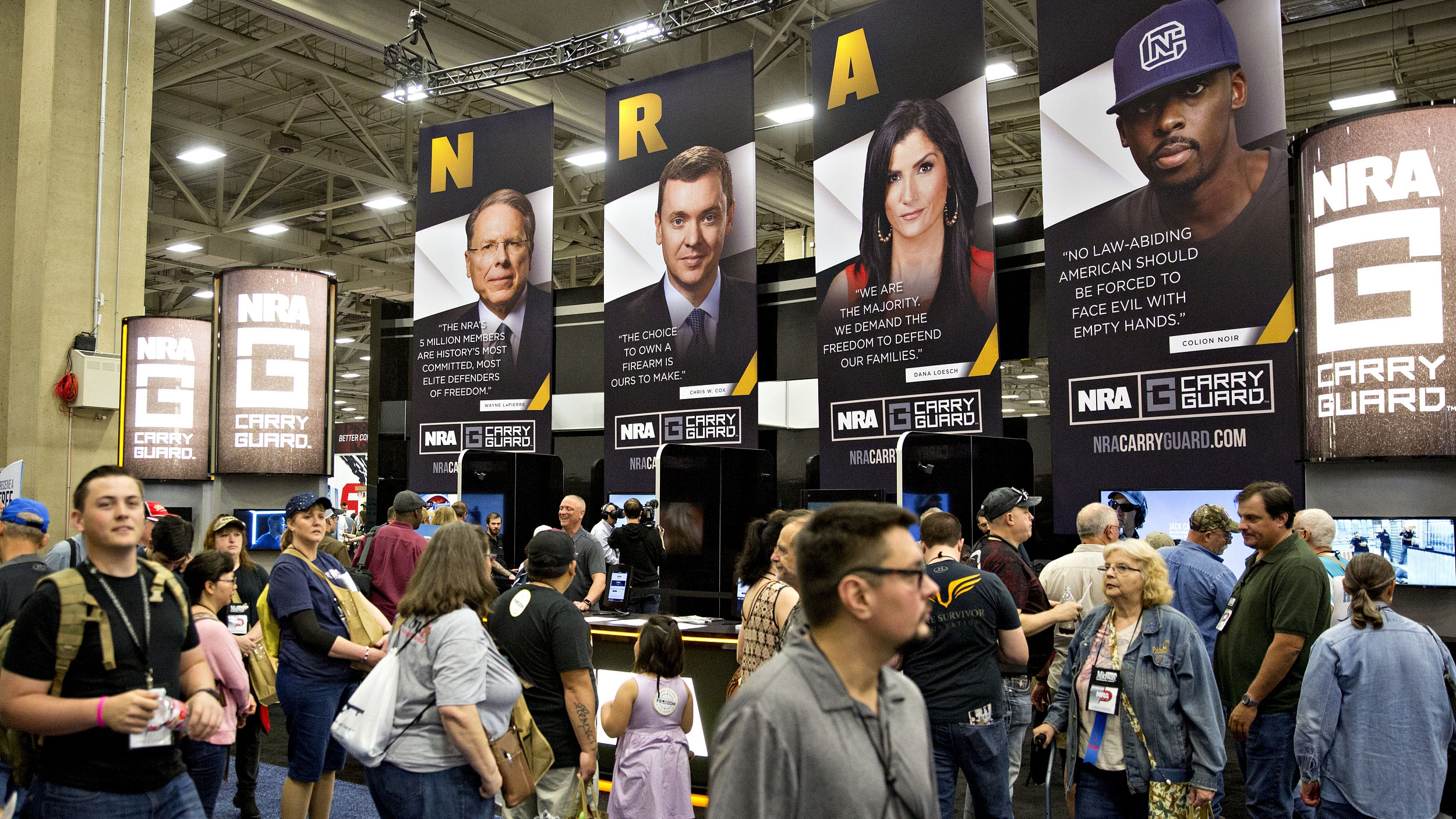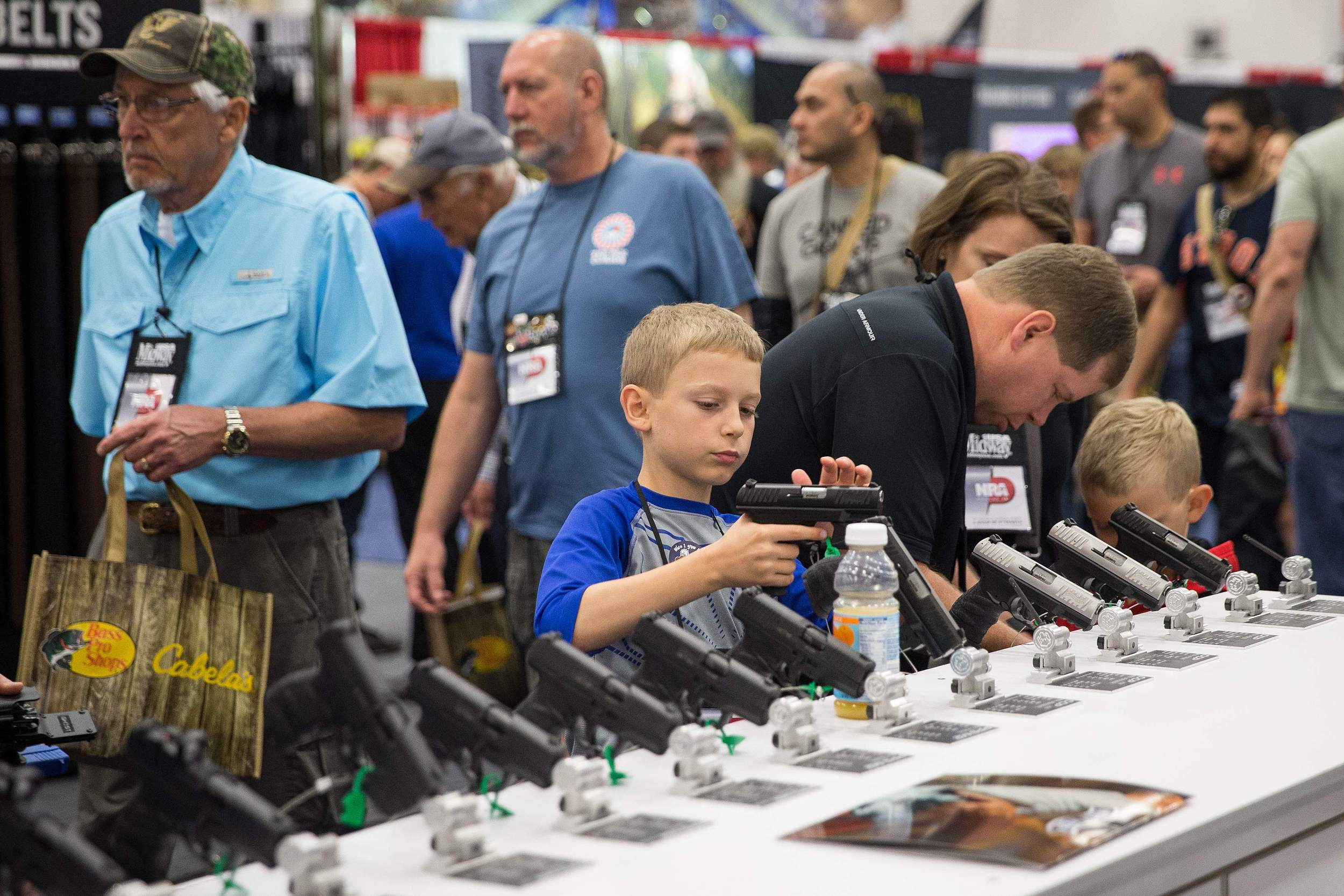

Attendees walk past the National Rifle Association (NRA) booth at the NRA annual meeting in Dallas, Texas, May 5, 2018. /VCG Photo
Three letters set tempers flaring whenever gun legislation is discussed in the wake of another U.S. mass shooting like the ones in Texas and Ohio over the weekend: NRA.
Supporters of the National Rifle Association say it defends their Second Amendment right to bear arms, while opponents of the powerful gun lobby accuse it of valuing financial profit over people's lives.
The undeniable fact is that the NRA has been a major player in U.S. politics for years, influencing policy.
Non-partisan beginnings
The NRA was set up in 1871, essentially as a gun club promoting shooting as a sport and encouraging good marksmanship, according to the organization's official history.
It was only in 1934 that it began advising on legislation "in response to repeated attacks on the Second Amendment rights."
For decades, the NRA was generally non-partisan, siding with neither the Democratic nor the Republican Party.
In the 1970s however, as its clout grew and gun legislation increasingly took center stage in policy debates, the group found its interests aligning with conservatives, advocating small government and individual freedoms.
The NRA now wields tremendous power at grassroots level and the lobby's cozy relationship with the Republican Party, as well as its huge influence on policy, has infuriated pro-gun control advocates.
Shaping policy
The NRA – which counts about five million members – spent a record 9.6 million U.S. dollars lobbying lawmakers and agencies in Washington, DC over the past two years, according to a Bloomberg report.
The Center for Responsive Politics (CRP) found over 200 House and Senate candidates – the vast majority of them Republicans – received contributions between 1,000 and 16,000 U.S. dollars from the NRA and affiliated individuals and groups between 2017 and 2018.

A young boy inspects a firearm in an exhibit hall at the NRA's annual convention in Dallas, Texas, May 5, 2018. /VCG Photo
Even as mass shootings have left a trail of bodies at schools, bars and shopping malls, efforts to pass stricter gun laws – including background checks, bans on assault weapons, and a rise in the minimum age for buying a firearm – have consistently failed, except for a ban on bump stocks implemented in March.
Advocates of tougher gun legislation have no doubt who is to blame: the NRA and its allies in government.
Former President Barack Obama also slammed the group in 2016 for distorting the debate.
"The NRA has convinced many of its members that somebody's going to come grab your guns," he noted.
Obama's Republican successor, Donald Trump, has been much less critical, speaking at the NRA's annual meeting five years in a row.
Americans and firearms
Gun ownership has long been seen as a key right in the U.S. based on the Constitution's Second Amendment, which states that "the right of the people to keep and bear arms shall not be infringed."
A Pew Research Center study in 2017 found that 30 percent of Americans own a gun.
The 2018 Small Arms Survey estimated there were 393 million firearms in civilian hands in the U.S., equivalent to over 120 per 100 inhabitants and far more than in any other country in the world.
Increasingly, however, such figures are listed alongside statistics of mass shootings. This year alone, there have been 255 incidents in the U.S., according to the Gun Violence Archive. In just the last week, three people were killed at a California food festival, at least 20 people died after a gunman opened fire at a Walmart store in El Paso, Texas and nine more were killed in a popular bar district in Dayton, Ohio.

Local residents react beside a makeshift memorial outside the Cielo Vista Mall Walmart where a shooting left 20 people dead in El Paso, Texas, August 4, 2019. /VCG Photo
The NRA on Sunday expressed its "deepest sympathies" to the victims and their families, but added it remained "committed" to defending "those exercising their Second Amendment freedoms."
Its uncompromising stance in defense of individual gun owners as well as gun manufacturers has helped secure a strong base in crucial states, which in turn has helped to sway elections.
"There's no denying that much of the strength of… the National Rifle Association (NRA), comes from its broad and passionate membership base and its mastery of grassroots politics," the CRP noted.
Under the gun
But the once almighty NRA has suffered several blows in the past few months.
Its president Oliver North was ousted in April in a very public power struggle with long-time CEO Wayne LaPierre. North had alleged financial improprieties among the group's leaders. LaPierre however accused North of trying to oust him.
The NRA's chief lobbyist Chris Cox also resigned as part of the scandal, and three board members announced their departure last week saying they had lost confidence in the organization's leadership, the Washington Post reported.
New York's state attorney general is meanwhile investigating the group – which is officially non-profit – over its tax-exempt status, amid reports of financial troubles and falling membership.
The NRA "is in total meltdown," Politico concluded.
Still, with its years of lobbying experience and strong grassroots support, its influence is unlikely to disappear overnight.

Copyright © 2018 CGTN. Beijing ICP prepared NO.16065310-3
Copyright © 2018 CGTN. Beijing ICP prepared NO.16065310-3